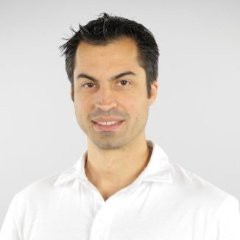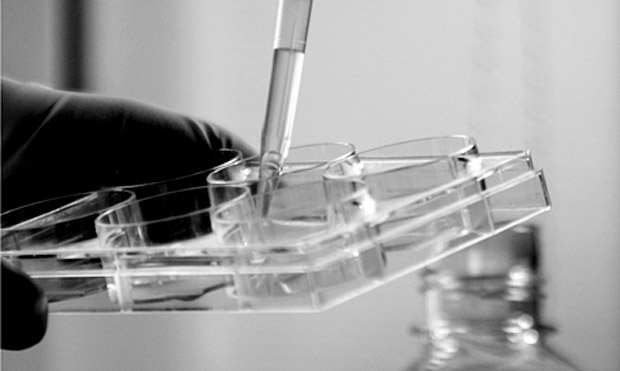This story is part of our ongoing exploration of synthetic biology and the DIYbio movement. Learn more by downloading a free edition of BioCoder.
Ryan Bethencourt seized his opportunity back in 2008. That made him an outlier: most people, after all, were seizing pink slips, not opportunities. But while the Great Recession wiped out billions in home equity and blew up companies by the score, it also freed up plenty of hard assets. In simple terms, you could buy a lot of expensive stuff for a song. And that’s just what Bethencourt and his pal, molecular biologist and fellow DIYbio enthusiast, John Schloendorn, did.
“The financial crisis resulted in the liquidation of a big chunk of the biotechnology sector,” says Bethencourt, a molecular geneticist-cum-biotech entrepreneur who was working as a business development director for a clinical research organization at the time. “So we bought up a lot of research-grade equipment. We felt we couldn’t afford to pass it up.”
Bethencourt and Schloendorn had a dream, one shared by garage bands around the world: to make a very big impact. But they were enraptured with biotech, not rock music.
“So, with some of our friends, John started his garage lab in Mountain View [Calif.],” says Bethencourt. “There were a lot of newly graduated students hanging out there — it was a kind of flophouse, really. People would ask me what we were doing, and John and Eri [Gentry] would tell them they were trying to find a cure for cancer. And that was the truth. John had a theory that some people’s white blood cells were better at killing cancer than the white blood cells of other people. So, John and Eri spent quite a bit of time taking blood samples from all of our friends.”
No silver bullet for cancer came out of the lab, but it did prove to be an incubator in the entrepreneurial as well as microbiological sense. Schloendorn went on to team up with venture capitalist, hedge fund manager, and PayPal co-founder Peter Thiel to establish ImmunePath, a firm focused on Schloendorn’s work with white blood cells.
And in a larger sense, the garage lab established the ethos for the modern community DIY bio lab. In short order, Eri, Joe Jackson, and some like-minded colleagues founded BioCurious, a project that helped moved homegrown biocoding out of the shadows into full transparency and sunlight. Located in Sunnyvale, Calif., BioCurious offers low-cost lab access to anyone interested in biotech, from the inquisitive dabbler to the accomplished biohacker. It is also an agora (or perhaps a fermenting tank would be a more apt metaphor) where biohackers can discuss and develop exciting ideas.

Ryan Bethencourt
“It‘s a great project, but most of the people involved wanted to run it as a nonprofit, and I thought we should manage it as a business venture,” Bethencourt says. “So, we ultimately parted ways.”
And that led Bethencourt to a subsequent venture: Berkeley BioLabs, co-founded with biophysicist Ron Shigeta. This “hackubator” links biohackers, either aspiring or accomplished, with lab space, state-of-the-art equipment, and access to funding partners. “Dedicated lab bench pricing starts at $500 a month, and biohacker memberships start at $150,” says Bethencourt. “We’re here to help people take their ideas through development to a fundraising round and ultimately, great products.”
But Berkeley BioLabs isn’t Bethencourt’s only extant venture. He’s also a co-founder and board member of Counter Culture Labs (a Bay Area DIYbio community lab focused on education and mentoring), and a life sciences mentor at the Thiel Foundation.
Perhaps most notably, he recently was appointed as senior director in Life Sciences Prize Development for the XPRIZE, the global innovator of groundbreaking high-tech prize competitions. Founded in 1995, the XPRIZE already has made huge pay-outs for bleeding-edge innovations, including $10 million for the first successful private space plane to reach suborbital flight, affordable vehicles that exceed 100 mpg in fuel economy, $2 million for advanced rocket development, and $1.4 million for efficient oil spill clean-up systems. Focusing on molecular biology, stem cell research, artificial intelligence, bionics, synthetic biology, and organogenesis, Bethencourt helps XPRIZE’s development team establish the next round of incentive competitions, expected to tally between $10 million to $30 million in prize funding.
But even these projects don’t fully encompass Bethencourt’s reach (or grasp). He has participated in more than 15 business and non-profit start-ups. Some stand out for, well, their poignancy. Halpin Neurosciences, for example: Bethencourt co-founded it with entrepreneur and angel investor Les Halpin and Obillex founder Damian Crowe in 2011. The company’s mission was simple: save Halpin’s life. He was dying of ALS, and the options for innovative therapies — i.e., genomic medicine — were almost nil for such patients.
“There are times on a project like this when you feel like you’re standing at the edge of a precipice looking into a void. But you keep at it because that’s the only way you’ll find anything.”
“It was a rough ride,” recalls Bethencourt. “We identified some promising molecules — specifically one known as J147 — but Les passed away before we could bring anything through development. We eventually had to close the company due to lack of funding. Our chief researcher, Eric Valor, also has ALS. He is essentially totally paralyzed, and uses a program that allows him to type through eye movement. Just working with these guys was such a humbling experience. They’re so courageous in the face of such a devastating diagnosis, so determined to make each day full and productive. There are times on a project like this when you feel like you’re standing at the edge of a precipice looking into a void. Or like you’re groping around in a cave. You’re spelunking. But you keep at it because that’s the only way you’ll find anything.”
What’s next for Bethencourt? A venture partnership with Indie.Bio, a San Francisco-based biotech accelerator. He’ll be the program director for the new program, which is offering $50,000 in start-up capital per team, access to a Biosafety Level 2 wetlab in the heart of downtown San Francisco, and mentorship in both science and entrepreneurship — all for an 8% equity slice; each year Indie Bio will be building and funding 30 biotech companies.
Bethencourt keeps moving, continually pushing the existing envelope for biotech. He insists it’s not the hope of a big payoff that drives him — it’s the process that he finds irresistible, the sense that he is helping trailblaze a new frontier.
“Basically, I eat, breathe — live — biotech,” he says. “It’s really all I do at this point.”
But while he’s a booster for the technology, he also has some constructive criticism for the culture that supports it.
“When people make their fortunes in digital technology, they’ve tended to reinvest in the sector,” he observes. “Doing that is almost a point of pride. Unhappily, you don’t see the same thing happening in biotechnology — when people hit it big, they often cash out. That has to change. It takes a lot of money to do biotech. It’s easier and cheaper to tinker with silicon than carbon. We’re starting to see things open up with community labs and access to basic tools. But we need more. A lot more.”
This post was originally published on Medium. Cropped image by Laurent Goletz on Flickr. Used under a Creative Commons license.

